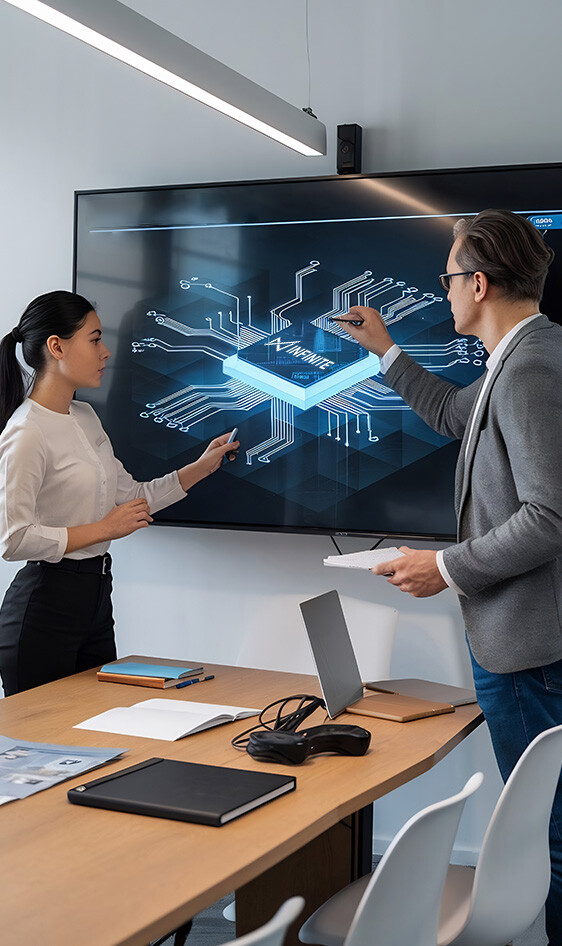3 min read
The Future of Accounting Tech: Where Accountants Fit In
The landscape of accounting has undergone significant transformations over the past few decades, driven largely by advancements in technology. From the introduction of electronic spreadsheets to cloud-based accounting software, these innovations have streamlined processes, increased accuracy, and allowed accountants to provide more value to their clients. But as we look ahead, the future of accounting technology promises even more dramatic changes. This future will see accountants and CPAs not just adapting to new tools, but reimagining their roles entirely in a tech-driven environment.

The Rise of Automation and AI
Automation and artificial intelligence (AI) are already reshaping the accounting profession. Tasks that once required hours of manual effort, such as data entry, reconciliation, and report generation, are now being handled by algorithms. AI-powered tools can analyze vast amounts of data in seconds, identify anomalies, and even predict future trends.
In this future, the role of the accountant will shift from performing routine tasks to overseeing the machines that perform them. Accountants will need to understand how these technologies work, ensuring that they are correctly implemented and that the data they produce is accurate. They will also need to interpret the results generated by AI, providing context and insight that machines cannot.
The Shift to Strategic Advisory Roles
As technology takes over more of the traditional accounting tasks, accountants and CPAs will increasingly move into strategic advisory roles. Instead of spending their time crunching numbers, they will focus on helping businesses make informed decisions based on the insights provided by advanced analytics tools.
This shift is already underway, with many firms offering client advisory services (CAS) as a key part of their offerings. In the future, this trend will accelerate. Accountants will become trusted advisors who guide their clients through complex financial landscapes, leveraging technology to provide deeper insights and more personalized advice.
For example, predictive analytics can help businesses forecast cash flow, identify potential risks, and plan for growth. Accountants who can interpret these analytics and provide strategic recommendations will be invaluable. They will need to be well-versed in the latest technologies and understand how to apply them to their clients' specific needs.

Continuous Learning and Adaptation
The rapid pace of technological change means that accountants and CPAs will need to be lifelong learners. The skills that were essential five years ago may no longer be relevant, replaced by new tools and techniques. To stay ahead, accounting professionals will need to continually update their knowledge and skills.
This could involve formal education, such as pursuing advanced degrees or certifications in areas like data analytics, cybersecurity, or AI. But it will also require a mindset of curiosity and adaptability. Accountants will need to be comfortable with change, willing to experiment with new tools, and able to quickly learn and apply new concepts.
In addition, firms will need to invest in ongoing training and development for their staff. This might include regular workshops, online courses, and access to the latest technology. By fostering a culture of continuous learning, firms can ensure that their teams are prepared for the future.
The Importance of Data Security and Ethics
As accounting technology becomes more advanced, the importance of data security and ethical considerations will grow. Accountants will be handling increasingly sensitive information, from financial data to personal details, and ensuring that this data is protected will be critical.
Cybersecurity will be a key concern, with accountants needing to understand how to protect their clients' data from breaches and other threats. This will require knowledge of the latest security protocols and technologies, as well as an understanding of the legal and regulatory requirements around data protection.
Ethics will also play a central role in the future of accounting. As AI and automation take on more decision-making roles, accountants will need to ensure that these technologies are used responsibly. This includes understanding the potential biases in AI algorithms and making sure that decisions are made in a fair and transparent manner.

The Role of Human Judgment and Expertise
While technology will play an increasingly important role in accounting, it will never replace the need for human judgment and expertise. Machines can analyze data and identify patterns, but they cannot understand the nuances of a business or the complexities of human relationships. Accountants will still need to apply their professional judgment to interpret the results generated by technology and provide advice that takes into account the broader context.
In fact, as technology takes over more routine tasks, the human element of accounting will become even more important. Clients will value accountants who can explain complex concepts in a way that is easy to understand, who can provide reassurance in uncertain times, and who can build strong, trusting relationships.

The Future is Collaborative
The future of accounting technology is not about machines replacing humans; it's about collaboration between the two. Accountants and CPAs will work alongside AI and other technologies, using them to enhance their capabilities and provide more value to their clients.
This collaboration will require a new set of skills and a new way of thinking. Accountants will need to be tech-savvy, adaptable, and strategic. They will need to understand how to leverage technology to solve problems, make decisions, and drive growth.
But perhaps most importantly, they will need to remain focused on what has always been at the heart of the accounting profession: helping clients achieve their goals. Technology will change the tools and the processes, but the core mission of the accountant will remain the same.
The future of accounting technology is exciting, filled with possibilities that will transform the profession in ways we are only beginning to imagine. But while the tools may change, the role of the accountant will continue to be vital. By embracing technology and adapting to new ways of working, accountants and CPAs can ensure that they remain essential partners in their clients' success, now and in the future.
A big part of preparing for the future is ensuring you have a staff that’s up to the challenge — it helps to hire well. Check out our FREE hiring checklist, which gives you a range of questions and ideas to take into consideration in your talent search.





